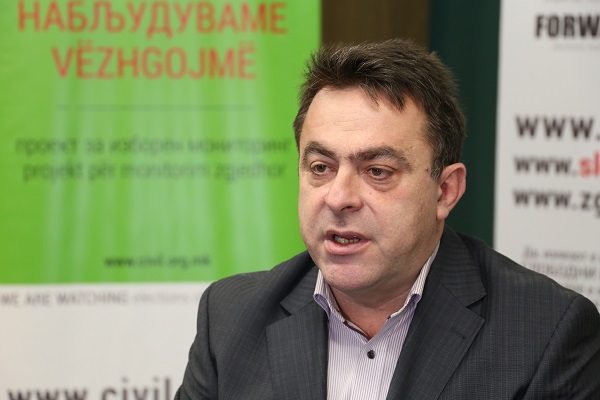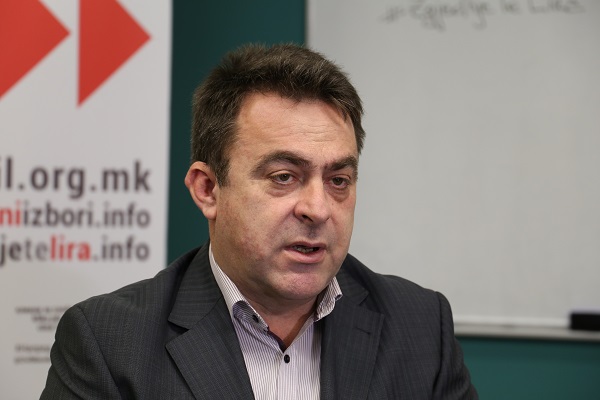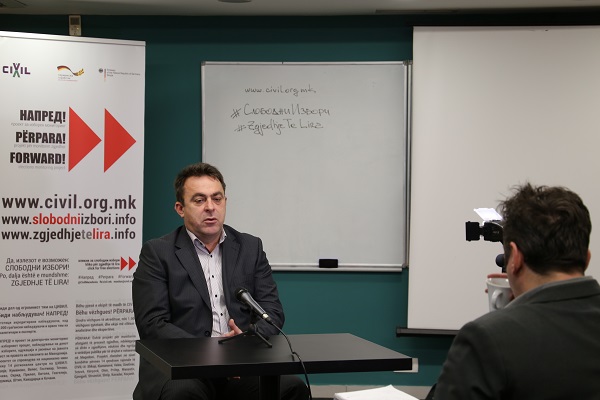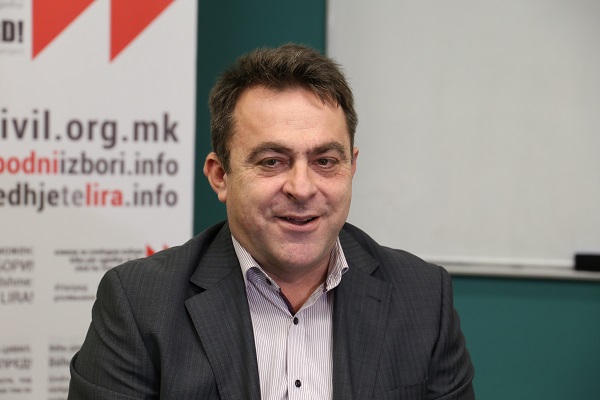Aleksandar Novakoski, lawyer and legal expert, former president of the State Election Commission, member of the expert team of CIVIL, analyses the election process in Republic of Macedonia:
Overall, the election process, starting with when they were announced and also the period prior to that, can be divided in three stages. First, we had a problem with the Voters Register that was not overcome, and this was confirmed on the day of the elections. According to my opinion, the problem lies in the inadequate methodology and in this respect we should expect remarks, having in consideration that the Voters Register has been for quite some time now a topic of all the election processes, depending on who had what kind of results, and that there has never been a final solution in this respect.
This time as well, the solution that was used and actively supported by most international factors and NGO’s, who were here but are long gone, showed once more that a solution has not been found. It hasn’t been found because, in my opinion, an inadequate methodology was used, agreed between the four political parties.


Second, it is good that the entire election process was agreed between the political parties and that they entirely took over responsibility, so the competent bodies for conducting elections were excluded. Hence, literally both the composition of the State Election Commission (SEC) and the manner of its work were determined by the four relevant political parties, who gave their representatives in the SEC. The change in the composition of the SEC, with the assigning of the three experts, did not show any advantage.
On the day of the elections we could see that there were many people who did not figure on the Voters Register. I constantly kept pointing out to that fact that this would happen, and it did happen. I was asked: “Why is that? How come?”
They think they are covered by the law. There actually is legal basis to defend the thesis that I know the SEC will defend with: “Well, the law allowed us!”, for all those who with cross-data will be determined unsuitable and for those who will not apply.
However, they have forgotten some key issues.
We made a mixed combination of active and passive registration of voters. My question is, why wasn’t the passive registration accepted, which was proposed by several experts? I also proposed it two years ago. The aim was for the Voters Register to be completely questioned.
For the first time, we have a large number of voters who were not able to exercise their right to vote. It is a serious violation of the right to vote, according to all international election standards. The number of these voters is not known, but whatever it is, it is a violation.
I would like to see how the OSCE and ODIHR will comment and report on this. This, because in the initial reports they mentioned it as a problem. But, if in this respect we take into consideration the law, perhaps they might pull back from such an assessment.
Furthermore, we had a peaceful election day and technically well-organized elections. But, taking into account the capacity of the SEC, it would be a shame not to have a well-organized day in terms of materials, preparations…
Concerning the final phase, the elections were peaceful, because the political parties guaranteed they would be. I have to say that for the first time we had a balanced media approach, it was obvious and we need to admit that.
And now we come to assessing the work of the SEC. By the complaints alone, the SEC showed that it is politicized, which means that again no solution has been found. And then the problem with not posting the results during the night. In my opinion, that is unacceptable.
This is where you can see those political calculations, which later showed that perhaps here they worked under pressure. With that pressure, and with the close results at these elections, the entire pressure shifted to the SEC and on deciding upon the complaints. I think that it is unacceptable for a composition that has three experts, who, had they been experts and were not biased, regardless of the discussions of the political representatives, could have solved those complaints very quickly. And those deadlines have been passed. That is why the Electoral Code will need to undergo changes, because in previous election cycles 200-300 complaints might have been solved. At the most peaceful elections up to 200-300 ballot boxes used to be opened and the entire material counted. Here again I think that an internal problem is the issue: coordination, organization and managing the election process.
I assure you that CIVIL’s remarks were in place. I will not get into assessing previous election cycles. Reports on them are public and available on the website. We here, might now again face new remarks, which we deserve. The deadlines have indeed been distastefully and unacceptably passed.
When deadlines are passed with a small number of complaints, it automatically means that pressure and politicization are the issue. I wonder why the members of the Electoral Boards from the political parties, for example, had not made any remarks in the report when they had noticed such a number of invalid ballots.
I understand the situation in the SEC, there is a 48-hour deadline for posting the results. CIVIL as a non-governmental organization can make suggestions. But the problem is when members of electoral boards have not made notifications for invalid ballots, and in the meantime we have two complaints, which obviously shows the aim for something to change. The number of invalid ballots is overlooked, but is significant.


The number of invalid ballots is significant and now there are speculations that they were made invalid for certain reasons, that most of the invalid ballots incurred under certain circumstances. In order to avoid such speculations, if members of electoral boards from political parties made such notifications, then the SEC would have had to open them, check them, and it would have been clear even to a nonprofessional if invalid ballots had been made intentionally or unintentionally.
I remember one election process in which there really was a large number of invalid ballots, but when the boxes were opened it was determined that 90% of them had been intentionally made invalid, with names of actors or insulting words, and this can be checked.
The fact that there are no remarks from the members of the electoral boards is surprising. I have a comment on this matter. The parties knew they had a narrow difference and did not make remarks, because there were opposite cases when they had made remarks, and were used by the party that had lost. So, once again we come to the conclusion that it was the headquarters that decided, and not the electoral boards.
I have not changed my position in regards to the Voters Register. You also know about the accusations that there has been no census, and that is why the Voters Register is as it is. There may be a point in all those things, but the Voters Register can be abused if the electoral board allows it, otherwise it cannot be. You know that in certain places the turnout was 50, and even 60 percent, so again we have 40 percent who were on the list, but for some reasons did not want to vote. If the electoral board had been diligently doing its work, they would have not allowed for those votes to be abused.
There now is another problem. People who had gone to vote were not on the Voters Register. There are 600 examples in the prison alone. I do not know the other figure, but an analysis can be made following the final results on what the number is of people who had went to vote, but who did not figure on the Voters Register. I will repeat, I do not believe that the Voters Register could have been abused at these elections by having someone allowing someone else to vote. There was a case, and it was under appeal. If there had been more cases, as NGO’s reported, then the electoral boards have covered up themselves.


Again we come back to the electoral boards. They had informed the Municipal Election Commission and the SEC, whereas the SEC had not responded. If you remember the press conference on the day of the elections when they said it was nothing, only 20 people, and at the end it turned out to be 330 people, official complaints. In order for someone to submit official complaints, you need to have someone from Delcevo submitting it, not everyone has conditions to come to Skopje to submit a complaint, and you know what happens with the electronic submission of complaints. The website was hacked, then it wasn’t, and then it could not be checked…
If that number is high, regardless of the fact that the elections have ended, then we have a serious problem. That means that we have deprived several thousand people from their right to vote. And if those thousand people had voted, they would have changed mandates, as you could see at the election rerun.
As to the election rerun and the decisions of the Administrative Court, I had a statement that was completely abused by the media. I had said that the SEC could annul ex-officio, and if it could see that there were irregularities in the voting caused by the electoral boards, if there were disruptions, if the UV lamps were not working. There is abuse even if an UV lamp is not working for 30 minutes.
Why are you putting the entire Electoral Board in a situation to have to give expertise? In future, a crooked political party party, and we have such parties, might file a thousand complaints with a thousand graphology expertises. And the elections will not end in six months.
If that is the case, then there should be changes to the law! The deadline is short…That is why the deadline is extended, the final results are published, whereas the competent bodies look into the rest of the issues.
If one signature is the issue, and they determine whether it has been abused or not, what about those who were not able to vote, thousands of people? Accordingly, does this mean that the signature of the citizen that was investigated is stronger than the vote of the others? It is good that they opened that case, but the issue is when they run into such irregularity, there is no need to request a graphologist. It is annulled ex officio and there is a rerun! In this case not even the Administrative Court can do anything. That was my opinion, and not that it should not be checked. Everything needs to be checked. But, within those deadlines, if you are not constantly educating the members of the electoral board to notify of invalid ballots, do not expect later for the NGO’s to solve that problem. Nobody can solve that problem after.
Obviously, they had all calculated and we have no information on whether they did or did not make remarks in the reports, but the parties did not use them for appropriate complaints or we do not know about that, because the results suited them.
Produced and Edited by: CIVIL Media team
Photo by: Biljana Jordanovska















